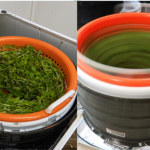Projects
In Progress
The short-term goal of this project is to increase the understanding and mitigating risk factors associated with cleaning,sanitation, cross contamination, detection, and worker behaviors in food production. The long-term goal of this work will help to reduce the overall risk of foodborne illness.
• Objective 1: Understanding of the parameters needed for effective delivery of natural food-grade antimicrobials for use infoods and food processing environments
• Objective 2: Identifying the genetic determinants of Listeria monocytogenes persistence in the food processing environment using genome-wide association (GWA) analysis.
• Objective 3: Mitigating and controlling viral risks to food safety and food production.
• Objectives 4: Conduct applied research relevant to food safety, design supports for adopting practices that will reduce the overall risk of foodborne illness, increase food safety knowledge of producers and processors, and increase access to local and national wholesale markets.
Completed
The Food Science team at the University of Massachusetts investigated the risk of microbial cross-contamination associated with postharvest drying processing using modified washing machines to spin dry leafy green processing. Conducting the scientifically-based assessment of postharvest practices helped to identify risks and determine practical, easily implemented measures for small-scale production operations.
The incidence and prevalence of many chronic diseases are dramatically increasing in the United States and other countries, making these disorders a serious health problem. It is of practical importance to better understand the roles of food-derived bioactive compounds in development of these chronic diseases, in order to provide optimized dietary recommendations or guidelines, and/or develop safe and effective strategies for disease prevention. In this project, we will focus on two major areas: (1) to better understand the effects and mechanisms of food bioactives on development of chronic diseases such a inflammation, aging, and energy metabolism, and (2) to further understand the factors contributing to the poor bioavailability of food bioactives and develop novel strategies to enhance their metabolic stabilities and health-promoting effects. Together, these efforts will provide the fundamental knowledge which is critical to develop safe and effective diet-based strategies for disease prevention, resulting in significant and positive impact for public health.
Food safety is very much an agricultural issue.
This multi-researcher project will focus on four critical aspects of food safety: understanding the scope of food safety problems, characterizing the scientific basis of pathogenic organisms' survival, development of methodology for detection, and translating knowledge through food safety extension research and activates. Together these activities will contribute to the long term goal of reducing the overall risk of foodborne illness.
Dietary factors are important predictors of long term health and the incidence of chronic disease. Laboratory methods will be employed, primarily in vitro models, such as in vitro digestion and tissue cultures, which will be used to evaluate the bioactivity of nutrients and other food bioactives to understand the mechanisms. The investigator will seek to advance the science of defining the role of bioactive dietary constituents for optimal human health. This will provide fertile grounds for ongoing collaborations and future collaborative research and grant proposal development.
